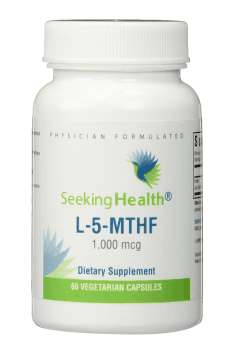If I asked you which of these vitamins was found naturally in food, folate or folic acid, would you know the right answer? If not, then you have found yourself in a good group and you have absolutely no reason to be ashamed of your ignorance. Medical specialists, doctors, nutritional experts and health professionals confuse these two substances, simply because their names are often used interchangeably, unfortunately it is a big mistake.
Vitamin B9 - folic, folate or L-5-MTF?
Many health care workers say that folic acid and folate are essentially the same nutrients. While folic acid is often considered a supplemental form of folate, there is an important distinction between these two compounds. In general, excessive doses of the synthetic form of this vitamin are not indicated, and in some situations may even prove harmful. More details will be presented below.
What is the difference between folic acid and folate?
Folate is a general term for determining the group of water-soluble B vitamins and is also known as vitamin B9. The name "folic acid" refers instead to the oxidized synthetic compound used in food supplements and to enrich food, whereas folate means follicle-based derivatives naturally found in food. (1)
The form of folate that can enter the folate metabolic cycle is tetrahydrofolate (THF). (2) Unlike natural folates that are metabolized to THF in the mucous membrane of the small intestine, folic acid undergoes pre-methylation in the liver where conversion to THF requires dihydrofolate reductase. The low activity of this enzyme in the human liver, combined with high intake of folic acid, can cause unnatural levels of unmetabolized folic acid entering the systemic circulation.
Several studies have found the presence of unmetabolized folic acid in the blood after ingestion of folic acid supplements or foods enriched with it. (3) Exposure to folic acid overdose did not occur until its chemical synthesis in 1943 and introduction as a compulsory food fortification in 1998. (4) The addition of folic acid to foods was considered mandatory because of the overwhelming evidence for protective effects of folic acid supplementation during the early development of neural tube defects (NTD) in newborns.
Threats associated with excessive intake of folic acid
While the incidence of NTD (neural tube defects) in the United States has been significantly reduced, there has been concern about chronic high levels of folic acid caused by enriched food, drinks and dietary supplements. (5) One of the main risks associated with excessive intake of folic acid is the development of various types of malignancies. (6) In patients with ischemic heart disease in Norway, where there is no food fortification with folic acid, folic acid and vitamin B12 treatment was associated with increased cancer outcomes and mortality for all reasons. In the United States, Canada and Chile, the establishment of a folic acid supplementation program was associated with an increased incidence of colon cancer. (7, 8) A daily dose of 1 mg folic acid was associated with an increased risk of prostate cancer. (9)
Researchers have hypothesized that excessive intake of folic acid in enriched foods can be directly related to the incidence of tumors. Excess folic acid can stimulate the growth of tumors, which can ultimately lead to malignant changes. The presence of unmetabolized folic acid in the blood is associated with reduced cytotoxicity. (10) Because natural "lethal" cells play a role in the destruction of cancer cells, excess folic acid can support existing pre-cancerous lesions and malignant lesions.

High intake of folic acid may mask the detection of vitamin B12 deficiency and lead to deterioration of the central nervous system function in the elderly. In one study, consumption of folic acid exceeding 400 micrograms per day among older people resulted in a much faster rate of decline in cognitive function than in people who did not use supplements. (11) Another study found a higher incidence of both anemia and cognitive impairment due to high intake of folic acid in older people with low levels of B12. (12) Because vitamin B12 deficiency is a common problem for many older people, these studies suggest that high levels of folic acid can cause serious consequences in cognitive behavior in older people.
Folate from natural sources is undoubtedly the best
Despite the risks associated with high levels of folic acid intake, it is well known that consumption of folate in the form of food rich in this compound is essential for good health. Folate supports the full development of red blood cells, lowers the level of homocysteine in the blood and supports the nervous system. It is well known that adequate supply is needed to prevent neural defects in newborns.
Excellent sources of folate in the diet are lettuce, spinach, asparagus, turnip, mustard, parsley, potato salad, broccoli, cauliflower, beets and lentils. (13)
You can also consider supplements of this ingredient if its intake in a natural form is not enough. Look for products that contain "5-methyltetrahydrofolate" or "5-MTHF" on the label. Avoid products that have "folic acid" on the label. Remember to check your multivitamin supplement, because most products of this type contain folic acid, not a healthier, more natural folate. A good example for a multi complex with folates is Optimal Multivitamin Plus. And for pregnant women - Optimal Prenatal.
Women planning pregnancy should consume 800 to 1200 mcg of folate daily for several months before starting to apply for a child. If you are pregnant or trying to get pregnant, I recommend supplementing 400-800 mcg folate daily, depending on the composition of the diet. A good brand containing folates on offer is Seeking Health, but there are several others that usually use 5-MTHF:
Other people, i.e. men and women who are not pregnant, can safely obtain the right amount of folate from a balanced and well-balanced diet.
- http://blog.designsforhealth.com/blog/bid/115121/Folic-Acid-vs-Folate-Part-I
- http://journals.cambridge.org/action/displayAbstract?fromPage=online&aid=1343280
- https://www.ncbi.nlm.nih.gov/pubmed/17697404
- https://www.ncbi.nlm.nih.gov/pubmed/18038944
- http://blog.designsforhealth.com/blog/bid/115121/Folic-Acid-vs-Folate-Part-I
- http://www.msnbc.msn.com/id/35874922/ns/health-diet_and_nutrition/t/your-breakfast-giving-you-cancer/
- http://cebp.aacrjournals.org/content/16/7/1325.abstract
- https://www.ncbi.nlm.nih.gov/pubmed/19190501
- https://jnci.oxfordjournals.org/content/101/6/432.full
- http://jn.nutrition.org/content/136/1/189.short
- https://www.ncbi.nlm.nih.gov/pubmed/15824266
- http://www.ajcn.org/content/85/1/193.abstract
- http://www.whfoods.com/genpage.php?tname=nutrient&dbid=63






